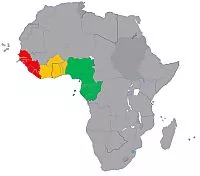Over the past 12 years, we have seen growing demand for risk management support from decision makers in African and Middle Eastern companies considering acquisitions, partnerships, and cross-border expansion in general. Personal relationships and experience are no longer enough, if ever they were. This cuts across a whole spectrum of concerns.
At Songhai Advisory, our focus has been at the market assessment, political risk, and reputational due diligence end of things. However, these requirements live alongside other important elements – in particular legal due diligence.
- Michael Applegate is a consultant based in Paris, Dubai and Uganda with over 25 years' experience in legal diligence including positions at the Kuwait Petroleum, Corporation, Gasol, EDF and Total E&P.
- Terry Prempeh is an Associate (Energy and Natural Resources) at Reed Smith whose experience includes working with national oil companies, global commodity traders, mining companies, banks, and non-bank lenders, including funds.
It was a privilege to chat with Michael Applegate (MA) and Terry Prempeh (TP) about what legal due diligence entails, its importance to deal making in our region and the ways in which it is developing in our region. Highlights are captured below.
--
1. What is legal due diligence really? In contrast with reputational/integrity due diligence for example?
TP. Legal due diligence is a process undertaken in corporate mergers and acquisitions. It is an investigative process where a potential purchaser or investor assesses the target company's assets and liabilities from a legal perspective.
The process involves collecting legal documents and information relating to the target company such as: existing contracts with third parties, licences and intellectually property information.
MA. Integrity due diligence is a view of the target from the outside looking in and in most cases before engaging substantially with the target.
Legal diligence, on the other hand, is essentially a walk around the house to verify claims made by the target upon which the acquisition price is based e.g., ownership, title, encumbrances of assets, absence of litigation or environmental violations.
2. How has 'the job' changed over the years?
TP. In recent times, the Middle East has opened up its doors to more investment and collaboration with the western world. This increase in global collaboration is underpinned by an increased transparency in the way Middle Eastern companies conduct their business in relation to anti-corruption, anti-bribery and sanctions. As large M&A transactions are increasingly crossing continents, it is important to assess the integrity of a potential target as well as its financial status.
The due diligence process is becoming an increasingly important exercise to see who a potential target is currently contracting with, not just how much they are contracting for.
In recent times, sanctions and exposure to counterparties has been at the forefront of the due diligence process, with potential investors particularly concerned about what exposure the target may have in relation to sanctioned counterparties and jurisdictions.
MA. Over the last few years, more and more negotiations, or follow-ups on due diligence, are being conducted virtually with a platform like Zoom or Teams.
3. Where do you see the field going?
MA. Relying on virtual due diligence and Zoom, more and more due diligence processes will be done virtually.
TP. Yes, legal due diligence can be an expensive exercise and there is a growing pressure on law firms to embrace technology to find efficiencies for clients. The use of artificial intelligence in the legal field is seen as a crucial step forward in helping lawyers to ‘work smart'. As law firms continue to invest in technology, the hope is that time-consuming, document heavy tasks such as legal due diligence will be completed in a more efficient and cost-effective way.
4. Given your experience in legal DD, what do you believe to be particularly important for successful deal making?
MA. Still, as I don't see how AI can replace people for complex tasks such as a legal due diligence, the only thing I can say is that ensuring the deal team has access to people with the requisite expertise – (accounting, HR, legal and environmental).
TP. Definitely. In our experience, concluding a transaction successfully starts with getting the due diligence scope right at the outset and embarking on a cooperative exercise all the way through to completion. Flushing out issues (and fixing them) as they arise only helps the process, as does continual and collaborative engagement with the sellers. The more clearly you are able to define the scope of the due diligence at the outset, the less time you will spend refining the process.
Also, investors will need legal support in acting in real time, both in identifying issues and in finding practical solutions to them as they arise. Of critical importance is distinguishing between fundamental issues that go to value and those that can be addressed or remediated in other ways.
If the target is in demand, it is a sellers' market. That is why engaging early on with experienced advisors who can help bridge the gaps between local conventions and international best practices on the tax, financial, commercial and legal sides of the deal is of paramount importance in ensuring deal certainty.
The content of this article is intended to provide a general guide to the subject matter. Specialist advice should be sought about your specific circumstances.


